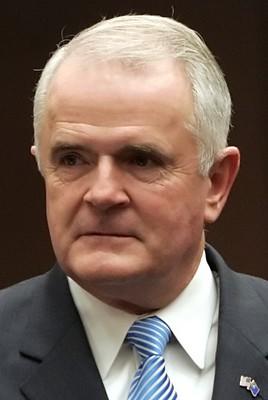Claims against Gibbons revealed
A newly available document states that Gov. Jim Gibbons "has admitted" that he urged federal authorities to pursue criminal action against a software developer whose business dispute with a friend of Gibbons has prompted a federal investigation.
The statement is made in a legal motion filed last year, but kept secret until Tuesday, when it was unsealed at a judge's order. The source of the claim that Gibbons made such an admission is not clear.
The motion was filed by attorneys representing Dennis Montgomery, whose civil dispute with his former business partner, Warren Trepp, contains accusations that Gibbons, while in Congress, helped Trepp get secret federal contracts in exchange for cash, gifts and campaign contributions.
Gibbons on Tuesday issued a statement denying that the claim in the motion was true, calling it "the same old fabrication that was concocted by Mr. Montgomery when he initiated his suit against his former partner. It is not true, as I have said before."
Montgomery has previously alleged that Gibbons asked authorities to raid Montgomery's house because it would benefit Trepp, and Gibbons has previously denied it. But the document unsealed Tuesday ups the ante by asserting that Gibbons acknowledges having done so.
"Congressman Gibbons has admitted that he initiated the criminal action on behalf of Trepp by 'making phone calls' to Reno U.S. Attorney Bogden and the FBI," the document states.
"Reno U.S. Attorney Bogden" is a reference to former Nevada U.S. Attorney Daniel Bogden, who was one of the federal prosecutors fired in the purge that has become a scandal in the U.S. Department of Justice.
Bogden has previously denied being involved in the raid or acting at Gibbons' behest.
Montgomery's lawyer, Michael Flynn, said Tuesday he could not comment on the filing. Flynn has asked to be removed as Montgomery's counsel.
The sentence referring to Gibbons' purported admission parenthetically cites three sources: a legal motion in the proceeding concerning the criminal action, none of which has been made public; a motion by Montgomery in the civil litigation that remains under seal; and a November article in the Wall Street Journal that first made public the allegations against Gibbons, but does not contain an admission by Gibbons that he called Bogden or the FBI.
In March 2006, with the civil lawsuit well under way, the Reno office of the FBI raided Montgomery's home seeking evidence for a potential criminal prosecution for theft of trade secrets. In the raid, agents seized more than two dozen hard drives that were thought to contain classified government secrets.
The hard drives turned out not to contain classified information. A federal judge ordered them returned to Montgomery, and another federal magistrate ruled the search was highly improper.
U.S. Magistrate Valerie Cooke said the agent who sought the search warrant for Montgomery's house and storage spaces was an "unwitting pawn" of Trepp in the civil dispute between Trepp and Montgomery. Cooke said criminal authorities shouldn't have involved themselves in a business dispute.
Montgomery contends Trepp needed the software codes on the hard drives to fulfill a $100 million defense contract whose deadline was looming. He said Trepp prevailed upon Gibbons to initiate the raid and seize the hard drives.
A lawyer for Trepp, Stephen Peek, said Tuesday he was familiar with the sealed documents and, while he could not disclose their specific contents, "Generally, I am unaware of any admission by Gibbons of making phone calls to Bogden or the FBI in any of the pleadings."
The source for the purported admission may be Montgomery himself, Peek contended.
Gibbons admits he helped secure contracts for the software company, eTreppid, that were contained in the secret federal "black budget."
Gibbons says Trepp is a longtime friend, and that he helped eTreppid because its product was worthy and the contracts would bring jobs to his congressional district.
Montgomery contends the contracts were payback for Trepp's support of Gibbons in the form of political donations, a Caribbean cruise, and cash. Gibbons is the subject of a Washington-based FBI investigation.
If Gibbons did lean on federal prosecutors to go after an enemy, "it's a blatant, overt misuse of political power," said Keith Ashdown, chief investigator for the Washington-based nonprofit Taxpayers for Common Sense.
"When it comes to the enforcement of our laws, legislators are not supposed to be, out of public view, trying to convince prosecutors to go after certain individuals," he said. "When a lawmaker calls the office of a prosecutor, they're stepping over the boundary."
Another expert said a phone call by Gibbons might have been acceptable if he was just passing on a tip, but not if any pressure was exerted based on his political power.
"There's nothing wrong with a congressman calling up the FBI or the U.S. attorney and saying, 'I think there's something going on here that you should look into,' " said Robert Fellmeth, director of the Center for Public Interest Law at the University of San Diego School of Law and a former federal prosecutor.
"But if the implication is, 'I will use my official position as someone of influence to make sure you do this, or else,' that's wrong," Fellmeth said. "The wrong is the use of power to influence the decision beyond the merits of the case."

















